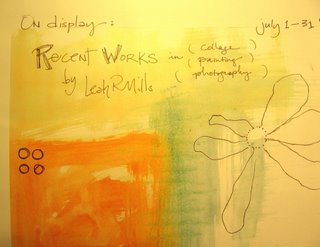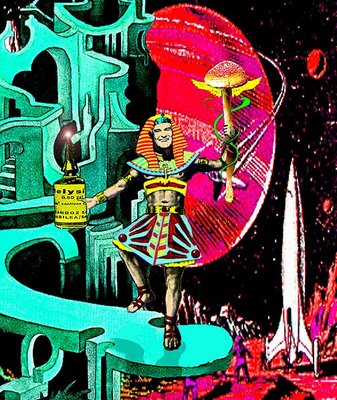
In 1933, in Science and Sanity, Alfred Korzybski proposed that we should abolish the "is of identity" from the English language. (The "is of identity" takes the form X is a Y. e.g., "Joe is a Communist," "Mary is a dumb file-clerk," "The universe is a giant machine," etc.) In 1949, D. David Bourland Jr. proposed the abolition of all forms of the words "is" or "to be" and the Bourland proposal (English without "isness") he called E-Prime, or English-Prime.
A few scientists have taken to writing in E-Prime (notable Dr. Albert Ellis and Dr. E.W. Kellogg III). Bourland, in a recent (not-yet-published) paper tells of a few cases in which scientific reports, unsatisfactory to sombunall members of a research group, suddenly made sense and became acceptable when re-written in E-Prime. By and large, however, E-Prime has not yet caught on either in learned circles or in popular speech.
(Oddly, most physicists write in E-Prime a large part of the time, due to the influence of Operationalism -- the philosophy that tells us to define things by operations performed -- but few have any awareness of E-prime as a discipline and most of them lapse into "isness" statements all too frequently, thereby confusing themselves and their readers. )
Nonetheless, E-Prime seems to solve many problems that otherwise appear intractable, and it also serves as an antibiotic against what Korzybski called "demonological thinking." Most of this book employs E-Prime so the reader could begin to get acquainted with this new way of mapping the world; in a few instances I allowed normal English, and its "isness" to intrude again (how many of you noticed that?), while discussing some of the weird and superstitious thinking that exists throughout our society and always occurs when "is" creeps into our concepts. (As a clue or warning, I placed each "is" in dubious quotation marks, to highlight its central role in the confusions there discussed).
As everybody with a home computer knows, the software can change the functioning of the hardware in radical and sometimes startling ways. The first law of computers -- so ancient that some claim it dates back to dark, Cthulhoid aeons when giant saurians and Richard Nixons still dominated the earth -- tells us succinctly, "Garbage In, Garbage Out" (or GIGO for short).
The wrong software guarantees wrong answers, or total gibberish. Conversely, the correct software, if you find it, will often "miraculously" solve problems that had hitherto appeared intractable.
Since the brain does not receive raw data, but edits data as we receive it, we need to understand the software the brain uses. The case for using E-Prime rests on the simple proposition that "isness" sets the brain into a medieval Aristotelian framework and makes it impossible to understand modern problems and opportunities. A classic case of GIGO, in short. Removing "isness" and writing/thinking only and always in operational/existential language sets us, conversely, in a modern universe where we can successfully deal with modern issues.

To begin to get the hang of E-Prime, consider the following two columns, the first written in Standard English and the second in English Prime.
Standard English//English Prime
1. The photon is a wave.// 1. The photon behaves as a wave when constrained by certain instruments.
2. The photon is a particle.// 2. The photon appears as a particle when constrained by other instruments.
3. John is unhappy and grouchy.// 3. John appears unhappy and grouchy in the office.
4. John is bright and cheerful.// 4. John appears bright and cheerful on holiday at the beach.
5. The car involved in the hit-and-run accident was a blue Ford.// 5. In memory, I think I recall the car involved in the hit-and-run accident as a blue Ford.
6. That is a fascist idea.// 6. That seems like a fascist idea to me.
7. Beethoven is better than Mozart.// 7. In my present mixed state of musical education and ignorance Beethoven seems better than Mozart to me.
8. Lady Chatterly's lover is a pornographic novel.// 8. Lady Chatterly's lover seems like a pornographic novel to me.
9. Grass is green.// 9. Grass registers as green to most human eyes.
10. The first man stabbed the second man with a knife.// 10. I think I saw the first man stab the second man with a knife.
In the first example a "metaphysical" or Aristotelian formulation in Standard English becomes an operational or existential formulation when rewritten in English Prime. This may appear of interest only to philosophers and scientists of an operationalist/phenomenologist bias, but consider what happens when we move to the second example.
Clearly, written in Standard English, "The photon is a wave," and "The photon is a particle" contradict each other, just like the sentences "Robin is a boy" and "Robin is a girl." Nonetheless, all through the nineteenth century physicists found themselves debating about this and, by the early 1920s, it became obvious that the experimental evidence depended on the instruments or the instrumental set-up (design) of the total experiment. One type of experiment always showed light traveling in waves, and another type always showed light traveling as discrete particles.
This contradiction created considerable consternation. As noted earlier, some quantum theorists joked about "wavicles." Others proclaimed in despair that "the universe is not rational" (by which they meant to indicate that the universe does not follow Aristotelian logic. ) Still others looked hopefully for the definitive experiment (not yet attained in 1990) which would clearly prove whether photons "are" waves or particles.
If we look, again, at the translations into English Prime, we see that no contradiction now exists at all, no "paradox," no "irrationality" in the universe. We also find that we have constrained ourselves to talk about what actually happened in spacetime, whereas in Standard English we allowed ourselves to talk about something that has never been observed in spacetime at all -- the "isness" or "whatness" or Aristotelian "essence" of the photon. (Niels Bohr's Complementarity Principle and Copenhagen Interpretation, the technical resolutions of the wave/particle duality within physics, amount to telling physicists to adopt "the spirit of E-Prime" without quite articulating E-Prime itself.)
The weakness of Aristotelian "isness" or "whatness" statements lies in their assumption of indwelling "thingness" -- the assumption that every "object" contains what the cynical German philosopher Max Stirner called "spooks." Thus in Moliere's famous joke, an ignorant doctor tries to impress some even more ignorant lay persons by "explaining" that opium makes us sleepy because it has a "sleep-inducing property" in it. By contrast a scientific or operational statement would define precisely how the structure of the opium molecule chemically bonds to specific receptor structures in the brain, describing actual events in the spacetime continuum.
In simpler words, the Aristotelian universe assumes an assembly of "things" with "essences" or "spooks" inside of them, where the modern scientific (or existentialist) universe assumes a network of structural relationships. (Look at the first two samples of Standard English and English Prime again, to see this distinction more clearly.)
Moliere's physician does not seem nearly as comical as the theology promulgated by the Vatican. According to Thomist Aristotelianism (the official Vatican philosophy) "things" not only have indwelling "essences" or "spooks" but also have external "accidents" or appearances. This "explains" the Miracle of the Transubstantiation. In this astounding, marvelous, totally wonderful, even mind-boggling Miracle, a piece of bread changes into the body part of a Jew who lived 2000 years ago.

Now the "accidents" -- which include everything you can observe about the bread, with your senses, or with the most subtle scientific instruments -- admittedly do not change. To your eyes or taste buds or electron microscopes the bread has undergone no change at all. It doesn't even weigh as much as a human body, but retains the weight of a small piece of bread. Nonetheless, to Catholics, after the Miracle (which any priest can perform) the bread "is" the body of the aforesaid dead Jew, one Yeshua ben Yusef, who the goys of the Vatican call Jesus Christ. In other words, the "essence" of the bread "is" the dead Jew.
It appears obvious that, within this framework, the "essence" of the bread can "be" anything, or can "be" asserted to "be" anything. It could "be" the essence of the Easter Bunny, or it could "be" Jesus and the Easter Bunny both, or it could "be" the Five Original Marx Brothers, or it could "be" a million other spooks happily co-existing in the realm outside spacetime where such metaphysical entities appear to reside.

Even more astounding, this Miracle can only happen if the priest has a Willy. Protestants, Jews, Zen Buddhists etc. have ordained many female clergy-persons in recent decades, but the Vatican remains firm in the principle that only a male -- a human with a Willy -- can transform the "essence" of bread into the "essence" of a dead body.
Like the cannibalism underlying this Rite, this phallus-worship dates back to Stone Age ideas about "essences" that can be transferred from one organism to another. Ritual homosexuality, as distinguished from homosexuality-for-fun, played a prominent role in many of the pagan fertility cults that got incorporated into the Catholic metaphysics. See Frazer's Golden Bough and Wright's Worship of the Generative Organs. It requires a phallus to transmute the bread into flesh because some of our early ancestors believed it requires a phallus to do any great work of Magick.)
In Standard English we may discuss all sorts of metaphysical and spooky matters, often without noticing that we have entered the realms of theology and demonology, whereas in English Prime we can only discuss actual experiences (or transactions) in the spacetime continuum. English Prime may not automatically transfer us into a scientific universe, in all cases, but it at least transfers us into existential or experiential modes, and it takes us out of medieval theology.
Now, those who enjoy theological and/or demonological speculations may continue to enjoy them, as far as I care. This book merely attempts to clarify the difference between theological speculations and actual experiences in spacetime, so that we do not wander into theology without realizing where we have gotten ourselves. The Supreme Court, for instance, wandered into theology (or demonology) when it proclaimes that "fuck" "is" an indecent word. The most one can say about that in scientific E-Prime would read: "The word 'fuck' appears indecent in the evaluations of x per cent of the population," X found by normal polling methods.
Turning next to the nigmatic John who "is" unhappy and grouchy yet also "is" bright and cheerful, we find a surprising parallel to the wave/particle duality. Remaining in the reality-tunnel of standard English, one might decide that John "really is" manic depressive. Or one speaker might decide that the other speaker hasn't "really" observed John carefully, or "is" an "untrustworthy witness." Again, the innocent-looking "is" causes us to populate the world with spooks, and may provoke us to heated debate, or violent quarrel. (That town in Northern Ireland mentioned earlier -- "is" it "really" Derry or Londonderry?)
Rewriting in English Prime we find "John appears unhappy and grouchy in the office" and "John appears bright and cheerful on holiday at the beach." We have left the realms of spooks and re-entered the existential or phenomenological world of actual experiences in spacetime. And, lo and behold, another metaphysical contradiction has disappeared in the process.
To say "John is" anything, incidentally, always opens the door to spooks and metaphysical debates. The historical logic of Aristotelian philosophy as embedded in Standard English always carries an association of stasis with every "is," unless the speaker or writer remembers to include a date, and even then linguistic habit will cause many to "not notice" the date and assume "is" means a stasis (an Aristotelian timeless essence or spook.)
For instance, "John is beardless" may deceive many people (but not trained police officers) if john becomes a wanted criminal and alters his appearance by growing a beard.
"John is a Protestant" or "John is a Catholic" may change any day, if John has developed a habit of philosophical speculation.
Even stranger, "John is a Jew" has at least five different meanings, some of which may change and some remain constant, and only one of which tells us anything about how John will behave in spacetime.....
"John is a plumber" also contains a fallacy. John may have quit plumbing since you saw him last and may work as a hair dresser now. Stranger things have happened. In E-Prime one would write "John had a job as a plumber last I knew."
Trivial? Overly pedantic? According to a recent article Professor Harry Weinberg -- curiously, an old acquaintance of mine -- once tried to emphasize these points to a class by trying to make them see the fallacy in the statement "John F. Kennedy is President of the United States." Dr. Weinberg pointed out that the inference, Nothing has changed since we came into this classroom, had not been checked by anybody who insisted the statement about Kennedy contained certainty. Weinberg, like his students, got the lesson driven home with more drama than anybody expected, because this class occurred on November 22, 1963, and everybody soon learned that during that class time John F. Kennedy had died of an assassin's bullet and Lyndon B. Johnson had taken the oath as President of the United States.
That makes the idea kind of hard to forget, doesn't it?
Looking at sample five -- "The car... was a blue Ford" we might again encounter Bertrand Russell's two-head paradox. It seems a blue Ford exists "in" the head of the witness, but whether the blue Ford also existed "outside" that head remains unsure. Even outside tricky psychology labs, ordinary perception has become problematical due to the whole sad history of eye-witness testimony frequently breaking down in court. Or does the "external universe" (including the blue Ford) exist in some super-Head somwhere? It seems that the translation into E-Prime -- "I recall the car... as a blue Ford" better accords with the experiential level of our existence in spacetime than the two heads and other paradoxes we might encounter in Standard English.
James Thurber tells us that he once saw an admiral, wearing a 19th Century naval uniform and old-fashioned side whiskers, peddling a unicycle down the middle of Fifth Avenue in New York. Fortunately, Thurber had broken his glasses and had not yet received replacements from the optometrist, so he did not worry seriously about his sanity. In the Castro section of San Francisco, a well-known homosexual area, I once saw a sign which said 'HALF GAY CLEANERS' -- but when I looked again, it said, 'HALF DAY CLEANERS'.
Even Aristotle, despite the abuse he has suffered in these pages, had enough common sense to point out, once, that "I see" always contains fallacy; we should say, "I have seen." Time always elapses between the impact of energy on the eye and the creation of an image (and associated name and ideas) in the brain, which explains why three eyewitnesses to a hit-and-run such as we postulate here may report, not just the blue Ford of the first speaker, but a blue VW or maybe even a green Toyota.

I once astonished a friend by remarking, apropos of UFOs, that I see two or three of them a week. As a student of Transactional Psychology, this does not surprise or alarm me. I also see UNFOs, as noted earlier -- and I do not rush to identify them as raccoons or groundhogs, like some people we met earlier. Most people see UNFOs, without thinking about the implications of this, especially when driving rapidly, but sometimes even when walking. We only find UFOs impressive because some people claim they "are" alien spaceships. My UFOs remain Unidentified, since they did not hang around long enough for me to form even a guess about them, but I have found no grounds for classifying them as space-ships. Anybody who does not see UFOs frequently, I think, has not mastered perception psychology or current neuroscience. The sky contains numerous things that go by too quickly for anybody to identify them.
My own wife has appeared as an UNFO to me on occasion -- usually around two or three in the morning when I get out of bed to go to the john and then encounter a Mysterious and Unknown figure emerging from the dark at the other end of the hall. In those cases, fortunately, identification did not take long, and I never reached for a blunt instrument to defend myself. Whatever my critics may suspect, I never mistook her for a squirrel.
If you think about it from the perspective of E-Prime, the world consists mostly of UFOs and UNFOs. Very few "things" (spacetime events) in the air or on the ground give us the opportunity to "identify" them with certainty.
In example six -- "That is a fascist idea" versus "That seems like a fascist idea to me" -- Standard English implies an indwelling essence of the medieval sort, does not describe an operation in spacetime, and mentions no instrument used in measuring the alleged "fascism" in the idea. The English Prime translation does not assume essences or spooks, describes the operation as occurring in the brain of the speaker and, implicitly, identifies said brain as the instrument making the evaluation. Not accidentally, Standard English also assumes a sort of "glass wall" between observer and observed, while English Prime draws us back into the modern quantum world where observer and observed form a seamless unity.
In examples 7 and 8, Standard English again assumes indwelling spooks and continues to separate observer and observed; English Prime assumes no spooks and reminds us of QUIP (the QUantum Inseparability Principle, so named by Dr. Nick Herbert), namely, the impossibility of existentially separating observer and observed.
Meditating on example 9 will give you the answer to a famous Zen koan, "Who is the Master who makes the grass green?" It might also save you from frequent quarrels (mostly occurring between husbands and wives) about whether the new curtains "are really" green or blue.
Example 10 introduces new subtleties. No explicit "is" appears in the Standard English, so even those trained in E-Prime may see no problem here. However, if the observation refers to a famous (and treacherous) experiment, well-known to psychologists, the Standard English version contains a hilarious fallacy.
I refer to the experiment in which two men rush into a psychology class, struggle and shout, and then one makes a stabbing motion and the other falls. The majority of students, whenever that has been tried, report a knife in the hand of the man who made the stabbing (knife-wielding) motion. In fact, the man used no knife. He used a banana.
Look back at the re-translation into E-Prime. It seems likely that persons trained in E-Prime will grow more cautious about their perceptions and not "rush to judgement" in the manner of most of us throughout history. They might even see the banana, instead of hallucinating a knife.
Exercises

1. Have the group experiment with rewriting the following Standard English sentences into English Prime. Observe carefully what disagreements or irratibility may arise.
"The fetus is a person."
"The zygote is a person."
"Every sperm is sacred/Every sperm is great/If a sperm is wasted/God gets quite irate." (M. Python)
"Pornography is murder." (A. Dworkin)
"John is homosexual."
"The table is four feet long."
"The human brain is a computer."
"When I took LSD, the whole universe was transformed."
"Beethoven was paranoid, Mozart was manic-depressive, and Wagner was megalomaniac."
"Today is Tuesday."
"Lady Chatterly's Lover is a sexist novel."
"Mice, voles and rabbits are all rodents."
"The patient is resisting therapy."
"Sin and redemption are theological fictions. The sense of sin and the sense of redemption are actual human experiences." (paraphrased from Ludwig Wittgenstein.)
taken from Quantum Psychology























